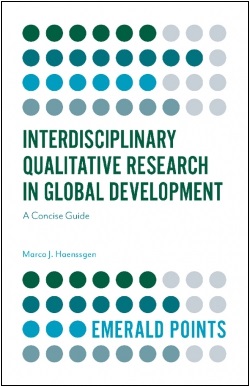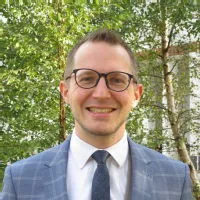New ‘field guide’ offers practical toolkit for Global Development research students and practitioners
 Drawing on his ten years’ experience of interdisciplinary research work in Asia and Europe, Dr Marco J Haenssgen’s new book is a practical introduction to qualitative research methods designed as a resource for students, for researchers and for research partners working on global development projects.
Drawing on his ten years’ experience of interdisciplinary research work in Asia and Europe, Dr Marco J Haenssgen’s new book is a practical introduction to qualitative research methods designed as a resource for students, for researchers and for research partners working on global development projects.
Interdisciplinary Qualitative Research in Global Development: A Concise Guide contains a wealth of practical examples and resources to help students and practitioners think through what good research looks like, and highlights some of the practical and ethical challenges which can face teams drawn from different academic disciplines working on international development issues.
Dr Haenssgen, Assistant Professor in Global Sustainable Development at the University of Warwick, said: “When training research project staff, and also when bringing my experiences back to the classroom, I found there was no handy, concise volume offering a broad overview of the range of methodological options available that I could bring into the training sessions or recommend to my students – so I felt it was a timely occasion to fill this gap.”
 In the book, Dr Haenssgen (pictured, right) introduces the range of options open to researchers, and offers practical advice on how they might combine data collection, sampling, and analysis techniques, and how they might present their findings. The book also addresses practical considerations and pitfalls in the course of an interdisciplinary research project: How can we formulate an authorship strategy for an interdisciplinary research project? What does a pre-submission enquiry look like? And how can we avoid past mistakes of extractive research practices in low- and middle-income countries?
In the book, Dr Haenssgen (pictured, right) introduces the range of options open to researchers, and offers practical advice on how they might combine data collection, sampling, and analysis techniques, and how they might present their findings. The book also addresses practical considerations and pitfalls in the course of an interdisciplinary research project: How can we formulate an authorship strategy for an interdisciplinary research project? What does a pre-submission enquiry look like? And how can we avoid past mistakes of extractive research practices in low- and middle-income countries?
Dr Haenssgen champions the use of social science research techniques to investigate health-related issues. Many of the examples in the book come from the major mixed-method interdisciplinary project, Antibiotics and Activity Spaces, which drew together theories and tools from public health, medical anthropology, sociology, and development economics to investigate antibiotic-related behaviour among vulnerable rural dwellers in Thailand and Laos, which Dr Haenssgen led.
Interdisciplinary work is increasingly seen as the most helpful way to investigate complex global development issues but is not always straightforward. Reflecting on the particular challenges facing interdisciplinary teams, Dr Haenssgen said: “Interdisciplinary work in general, and in global health in particular, is becoming more important as a way to solve complex problems in health and development.
“It’s important not to create the impression that success in interdisciplinary work comes automatically or easily - unless we are lucky. But where we can make it work, it’s definitely worthwhile and absolutely inspiring.
“Collaboration across the disciplines can open a window to a new world, like behaviours and interactions at the interface between patients and clinicians. Ultimately, insights gained from interdisciplinary work can break self-referential cycles and infuse social theory with new perspectives.
“Of course, the book cannot do everything and I would not expect somebody to guide, say, an ethnographic study merely on the basis of this book – but I really hope this book will be an accessible entry point to pragmatic uses of and conversations about qualitative research.”
ENDS
-
Interdisciplinary Qualitative Research in Global Development is published on 28 November 2019 by Emerald Publishing. ISBN 9781839092329
-
The Antibiotics and Activity Spaces project, a study of antibiotic-related health behaviour in rural Thailand and Lao PDR in 2017-2018, was funded by the Antimicrobial Resistance Cross Council Initiative supported by the seven research councils in partnership with the Department of Health and Department for Environment Food & Rural Affairs (grant ref. ES/P00511X/1, administered by the UK Economic and Social Research Council).
-
The Department for Global Sustainable Development at the University of Warwick was founded in 2015 with a remit to deliver a suite of innovative degree courses which take on the challenge of engaging with the UN’s Sustainable Development Goals in a multi-disciplinary and intellectually enriching environment. The department has grown to encompass 12 undergraduate degree courses and the Institute for Global Sustainable Development, which was established in 2017 to foster research that contributes to the sustainable development agenda across the global north and global south.
-
The Economic and Social Research Council (ESRC) is the UK’s largest funder of research on the social and economic questions facing us today. It supports the development and training of the UK’s future social scientists and also funds major studies that provide the infrastructure for research. ESRC-funded research informs policymakers and practitioners and helps make businesses, voluntary bodies and other organisations more effective. The ESRC also works collaboratively with six other UK research councils and Innovate UK to fund cross-disciplinary research and innovation addressing major societal challenges. The ESRC is an independent organisation, established by Royal Charter in 1965, and funded mainly by the Government.
